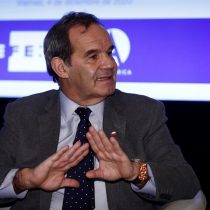
“Closing the gap between politics and citizenship” is one of the challenges of Chile’s constituent process, but it is also a “very global, of all democracies” challenge right now, Foreign Minister Andrés Allamand said this Friday.
During the plebiscite process, Allamand was one of the political faces who expressed his vote in favor of Rejection, that is, he did not want to have a new Constitution or a constituent process.
“At the heart of Chile’s social demand is to maintain progress by significantly incorporating elements of inclusion and social cohesion,” that is, “a new social contract,” as citizens think that economic progress is insufficient, if not accompanied by “equity,” added the chancellor in the EFE Grandstand – House of America in Madrid.
He recalled the three decades of democratic “progress,” poverty reduction and middle-class expansion in Chile, but countries on such a trajectory “are not immune to social outbursts” and “legitimate” demands against inequality, found, like the one that began in 2019, and that it led to the plebiscite of October 25 last, when more than 78% of voters called for a new constitution to be drafted.
“In Chile, we have managed to channel it with mechanisms of very high democratic participation”, where “violence is on its side,” he said in the debate, moderated by EFE International Director Esther Rebollo.
“When authority doesn’t understand protest, something is wrong (…) If you don’t understand the problem, you can misunderstand it,” according to the chancellor, who also called for curbing populism and polarization.
Asked whether the constituent process would be the end of Chile’s democratic transition, he preferred to talk about “a new stage”, which would end in a good outcome with everyone’s thrust.
Young people at the forefront
He insisted that the political challenge of “all democracies” is to generate public policies and factors that could reduce inequality, such as general access to high-quality education and a trade and productive system also aimed at SMEs.
He noted that in Chile, as in other countries, young people are the “trigger” of social mobilizations, high-level people, “much more demanding” with the authorities, who demand more equitable and environmentally friendly societies.
Hence, the “crack” between them and political institutions and the “abyss” between citizenship and leadership.
It is a democratic “crisis of representation”, and we must see how organizations and institutions adapt to the demands of renewal with different forms of participation, he said.
He recalled, however, that political organizations are the “nerve” with which democracy works.
On covid-19, he assured that government management was “full transparency” in the data, with the “networked” operation of public and private health systems, without reaching the “collapse”, being the country of the region that performs the most tests. All this has allowed a reopening of activities and borders, he explained.
Comparing mortality between this year and the previous ones, he said the results were reasonably positive, and vaccination would be since January and voluntary.
“We have good tax backs and that allows us to have resources for recovery” socioeconomic in 2021, apostilló the chancellor, who was presented by the director of the House of America, Antonio Pérez-Hernández.
It highlighted Chile’s “international” vocation commercial, economic, scientific and environmental.





